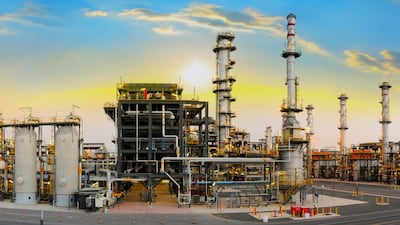Adnoc Gas, the integrated gas processing unit of Adnoc, reported a 24 per cent jump in its fourth-quarter profit as the company sold larger volumes of natural gas and other commodities amid higher prices.
The company’s net income rose to $1.35 billion in the three months that ended in December, it said in a filing to the Abu Dhabi Securities Exchange on Monday, where its shares are traded.
Revenue rose to $6.3 billion in the latest reported quarter from $5.89 billion in the same period a year earlier.
“Adnoc Gas delivered a strong set of results in 2023, overcoming a challenging market environment in the first half of the year,” said Ahmed Alebri, its chief executive.
“Adnoc Gas sustained its strong sales momentum during the year, signing new LNG [ liquefied natural gas] supply agreements valued between $9 billion and $12 billion, capitalising on the growing global demand for LNG as a transitional fuel.”
The company’s domestic gas production volumes grew 6 per cent year-on-year to 596 trillion British thermal units (tbtu) in the fourth quarter, while the volume of exported and traded liquids increased by more than 3 per cent to 260 tbtu.
Adnoc Gas’ share of LNG production volumes improved year on year to 64 tbtu from 45 tbtu.
Brent crude, the benchmark for two thirds of the world’s oil, was 6 per cent lower in 2023’s final quarter compared with a year ago, while Asian spot LNG prices declined by 61 per cent during the same period.
However, prices of liquefied petroleum gas and naphtha improved slightly annually, the company said.
Adnoc Gas supplies to customers, mostly utilities and industrial companies, throughout the UAE through an extensive network of pipelines.

It also produces a range of associated products, including ethane, butane and propane, paraffinic naphtha, gas condensate and sulphur that are sold to domestic and international customers.
Last year, parent company Adnoc raised about Dh9.1 billion ($2.5 billion) from the sale of a 5 per cent stake in the gas business in one of the largest initial public offerings of 2023.
Adnoc continues to own 90 per cent of the company, which has access to 95 per cent of the UAE's natural gas reserves, the seventh largest globally.
For the full-year 2023, Adnoc Gas’ net income dipped 2 per cent to $4.72 billion, while revenue declined by 12 per cent to $22.73 billion.
Domestic gas production volumes last year increased by 6 per cent to 2,315 tbtu, while the volume of exported and traded liquids rose by 2 per cent to 994 tbtu.
Adnoc Gas expects its sales volumes to be between 3,400 and 3,500 tbtu this year, compared with 3,540 tbtu in 2023.
“As with prior years, sales volumes should follow a seasonal pattern with an uptick over the summer period,” the company said.
Adnoc Gas said net profit unit margins for domestic gas products will record a “slight” single digit increase this year compared with 2023 and added that the company’s other products will contribute an additional $150 million in net income.
“It is important to remember that, from time to time, individual product prices may decouple from oil prices in line with prevailing supply demand evolution of the respective markets,” the company said.
Adnoc Gas plans to invest between $2 billion and $2.5 billion in 2024, marking a “significant” increase from the previous year.
This investment is driven by growth projects announced in 2023, it said.
For 2023, Adnoc Gas confirmed its dividend of $3.25 billion, of which an interim cash dividend of $1.625 billion was paid in December 2023 and a further $1.625 billion will be paid in the second quarter of 2024.
The company expects annual dividend growth of 5 per cent per share over the next four years, it said.

